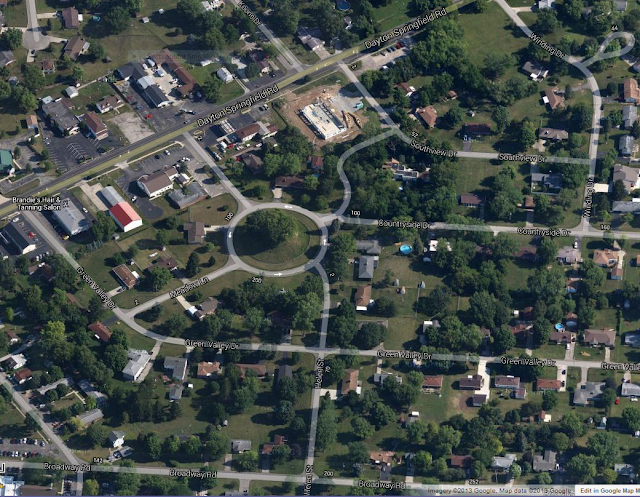 |
| From blueridgegenealogy.com. |
The question being, when did Americans decide that "going down in the river to pray" was a Christian thing? We don't know. Here's a source to very tentatively suggest that it might have "American Indian" roots.
Well, duh. How do we make sense of Pontiac's Rebellion "facing east from Indian country?' Gregory Evan Dowd even has his warrior going down to the river. To pray?
He suggests that we take seriously all those dream visions of warriors diving into the river and coming out at the lodge of the Master of Life. Dow also thinks that it is important that we are getting these anecdotes through intermediaries linked to Connecticut's New Light movement. I agree. My problem is only that Dowd follows the unfortunate trend to make these things strange, "in order to recapture the Indian's poiunt of view," where I would suggest just listening to Alison Krause and encountering the numinous. That the New Light influenced the divers of Pontiac's rebellion is obvious. That the connection is syncretism in the sense spelled out by Richard White is clear. I'm just asking that we understand that dult full-immersion baptism in the running waters of the local creek is not a weird thing born of the weird American proclivity to break up into small sects. It's whispers reaching across two continents coming down from Aztlan, of the sacredness of corn hoed from the thick river soil, and of paths through the bramble, cleared by fire, that lead the buffalo onto the prairie. I ask for that because this morning at dawn, the sachem came out of the sky house on the top of the pyramid, blew smoke to the four directions, and told us to celebrate the Green Corn.
I choose archaic terms. In no way is the President a sachem, and in no way is the pyramid on the Great Seal a reference to the great mounds. Summer idylls are not the Green Corn festival. To be sure, a comb drawn down a cob of (Chilliwack) corn will draw milky white, and everyone who has the time will go away to the lake. The point is that we will then float over deep waters like a historian over history.
That's an analogy I like. History is down there in the blue water, in the weeds. But the historians slide over the surface, going where they list, from wharf to the shore buoy to the beach and back. The weeds obsess us. Harmless as they are, they are frightening, reaching up to brush our legs no matter where we are. In our imaginations, anyway. The point is that we don't have to be above the weeds to imagine that they're there. The historical fact of the weeds can slip between the ages as easily as we slide across the surface of the water. It means what we need it to mean.
Now, I mark a different agricultural calendar here on the western shore of North American than in Old Europe. There, matters are a bit different. Wheat is a spring crop, not a summer one. The wheat is long since gathered in, and the great work of summer is ploughing. The ploughshare will turn the dark Earth up as many times as there is labour to do it.
It is something that people have been doing . . . . a long time. As long as there's been worked iron, maybe? That iron ploughshare was like a patch of weeds at the bottom of the lake, wherever you need it to be as you swim across the surface. Or we could take it seriously. It should be a big deal, if you take the idea that you build history from the bottom up seriously. The first iron ploughs. Ought they not have changed everything? According to another of those awesome studies coming out of the flowering of the Turkish academy, on the Upper Tigris about 3500 years ago, it did. (For those who read Turkish, or Google Translate gibberish.)
That's an analogy I like. History is down there in the blue water, in the weeds. But the historians slide over the surface, going where they list, from wharf to the shore buoy to the beach and back. The weeds obsess us. Harmless as they are, they are frightening, reaching up to brush our legs no matter where we are. In our imaginations, anyway. The point is that we don't have to be above the weeds to imagine that they're there. The historical fact of the weeds can slip between the ages as easily as we slide across the surface of the water. It means what we need it to mean.
Now, I mark a different agricultural calendar here on the western shore of North American than in Old Europe. There, matters are a bit different. Wheat is a spring crop, not a summer one. The wheat is long since gathered in, and the great work of summer is ploughing. The ploughshare will turn the dark Earth up as many times as there is labour to do it.
It is something that people have been doing . . . . a long time. As long as there's been worked iron, maybe? That iron ploughshare was like a patch of weeds at the bottom of the lake, wherever you need it to be as you swim across the surface. Or we could take it seriously. It should be a big deal, if you take the idea that you build history from the bottom up seriously. The first iron ploughs. Ought they not have changed everything? According to another of those awesome studies coming out of the flowering of the Turkish academy, on the Upper Tigris about 3500 years ago, it did. (For those who read Turkish, or Google Translate gibberish.)





